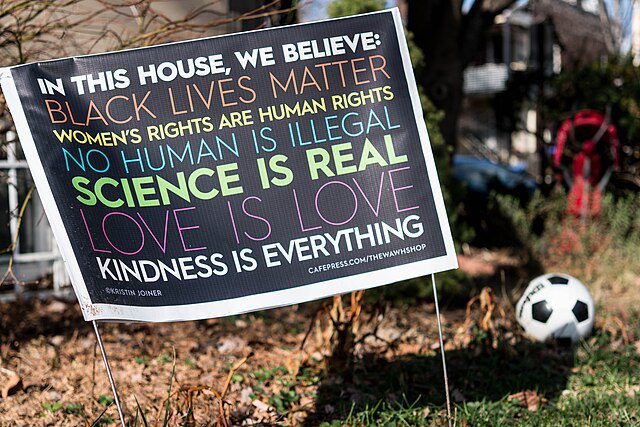The term is usually applied to expressions of “wokeness.” It is not enough to avoid saying things that are “politically incorrect.” One must also overtly say things to prove that you belong to the correct group.
Examples would include
yard signs expressing some version of this creed:
In This House, We Believe,
Black Lives Matter
Women’s Rights Are Human Rights
No Human Is Illegal
Science Is Real
Love Is Love
Kindness Is Everything.
Or when
Whole Foods puts up a poster that says, “We are part of a growing consciousness that is bigger than food — one that champions what’s good.”
Or when corporations boast about how diverse and green they are, even when they are nothing of the sort.
British journalist James Bartholomew is credited with popularizing the term, in its pejorative sense, in a piece he wrote for
The Spectator in 2015, entitled “
The Awful Rise of ‘Virtue Signalling,'” in which he complained,
No one actually has to do anything. Virtue comes from mere words or even from silently held beliefs. There was a time in the distant past when people thought you could only be virtuous by doing things…[that] involve effort and self-sacrifice.
Recently, another British publication,
Unherd, published an article by Kathleen Stock entitled “
Why Virtue Signalling Won’t Pay.” After discussing the failure of The Good Literary Agency and the financial problems of the Good Law Project, she advances the concept by pointing out the other side of the coin:
The flipside of being so mesmerised with superficial markers of virtue is that you are also shallow and credulous about what counts as vice. And so we find adults who genuinely think it plausible that a tech billionaire, well known for his enthusiastically awkward gestures, would deliberately perform a Nazi salute at a post-inauguration Presidential rally, as the latest stunt of those subtle intellects at Led By Donkeys suggests they do. Or we get the sort of people who interpret “Jewish” as identical to “Zionist”, and “Zionist” as identical to “genocidal maniac” without noticing any moral variations under those first two headings — as a former Save The Children staffer did in a TikTok video this week, to her cost. [Referring to a young woman who asked where she could buy anti-Zionist bagels.] And on the other side, we also get those who automatically equate “Pro-Palestinian protestors” with “hate marchers”. Obviously, there can be deliberate political strategy behind a particular decision to lump certain categories rather than split them, but equally, it sometimes seems that the art of fine moral discernment is just generally dying out.
Stock makes a good point, that those oriented to superficial markers of virtue will also look for superficial markers of vice. I’m intrigued by her last observation, that conservatives sometimes do this sort of thing too.
Some are saying that just as there is a woke progressivism, there is a woke conservatism. What might be some examples of conservative virtue signaling?
Is there a Christian virtue signaling? It’s hard to imagine that, since signaling that you are a Christian–say, by wearing a cross or putting up a church yard sign–is to confess that you are not virtuous, that you are a miserable sinner saved only by the crucifixion of the Son of God.
Nevertheless, there have always been temptations for Christians and other religious folk to trumpet their righteousness, that is to say, their self-righteousness. This, of course, is what Jesus complained about in his condemnation of the Pharisees. To give but one of many examples:
“Woe to you, scribes and Pharisees, hypocrites! For you are like whitewashed tombs, which outwardly appear beautiful, but within are full of dead people’s bones and all uncleanness. So you also outwardly appear righteous to others, but within you are full of hypocrisy and lawlessness. (Matthew 23:27-28)
Behind this impulse for self-righteousness and the need to display that to others is a tacit recognition that morality is real and that we feel an obligation to abide by it. Ironically, many secularists who deny Christianity (since “science is real”) and who defy historic morality (since “love is love”) are the very ones who are most intent on virtue signaling.
This is an encouraging admission, an acknowledgment of the existence of virtue and an admission that they want to be virtuous. The problem, though, is that they are engaged in a futile attempt at self-justification. When we fail to be righteous, we can change the definition of righteousness so as to fit our own behavior. We thus justify ourselves.
Or, when we fail to be righteous, we can give up on trying to justify ourselves and instead have God justify us. We don’t have to declare ourselves righteous when God declares us to be righteous. This happens when we are united with Christ by faith, so that God the Son atones for our moral failures and we become clothed in His righteousness. “For all have sinned and fall short of the glory of God, and are justified by his grace as a gift, through the redemption that is in Christ Jesus, whom God put forward as a propitiation by his blood, to be received by faith” (Romans 3: 23-25).
Photo: “In This House, We Believe. . . ” by Lorie Shaull from Washington, United States – In this house, we believe…, CC BY-SA 2.0, https://commons.wikimedia.org/w/index.php?curid=55513784














